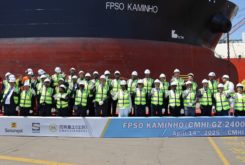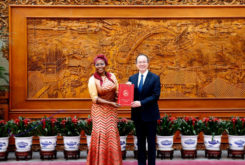The long awaited report about assets whose acquisition was supported by financing and guarantees from the Angolan State is finally completed and, in the words of the country´s president, the level of misappropriation found is “shocking and repugnant”.
President João Lourenço, who came to power in late 2017, chose the opening of the judicial year, on March 14, to make his public considerations about the report, that points to about USD 5000 millions of public funds having being used for the benefit of a small elite.
The speech was attended by members of the government, along with the country´s top magistrates and security officials.
In the wake of a three-year recession (2016-18), financial difficulties and amidst a major anti-corruption effort by the Government, the task force was launched at the end of 2018, and given a 60 day deadline to present “solutions” regarding these assets, which are both inside and outside Angola.
So far, the report´s content and solutions proposed are being kept secret by the Government, and access to the document highly restricted.
But references by Lourenço to the “former elite” confirm information that these are assets which today are in the hands of the “inner circle “of former President of the Republic, José Eduardo dos Santos and his family, in particular Isabel dos Santos and Marta dos Santos.
Reliable sources said that the shareholdings currently held resulted from the transfer of state company assets or dismantled institutions, without a formal privatization process or transfer of ownership.
The universe of large companies that are likely to be included includes Kero, Candando, Unitel, Movicel, cement companies, breweries, and others. Through the Angolan media, the Presidency made known at the end of January that among the assets that the State intends to bring to the public sphere are shareholdings in companies such as Biocom, Grandes Moagens, CFI, Média Nova, Dams of Mabubas and Lomaum or the Special Economic Zone, among others.
The current shareholders of these companies include two of the most trusted men of the former president, “Dino” (Biocom CFI, Media Nova) and Hélder Vieira Dias “Kopelipa” (CFI, Media Nova), but also Manuel Vicente (CFI, Media Nova) and Carlos Feijó (Grandes Moagens).
One of the reasons of Lourenço’s anti-corruption effort is to creat a business environment capable of attracting large-scale private foreign investment.
The process will also lead, in the medium-term, to the privatization of companies that will be expropriated from their current owners – an extraordinary source of income for the State Budget.
For Lourenço, the measure is also a way to reduce or nullify the economic power of adversary interest groups involved in corruption and, eventually, the ability to promote internal turmoil.
Unitel is the company where the process could be more useful for the state in the short term: its capital is currently held in 25% by Sonangol, the State oil conglomerate, and in equal stakes by Oi from Brazil, Isabel dos Santos and Cochan, controlled by Leopoldino do Nascimento “Dino”, a loyalist of the former president.
Shareholders have been at odds, with dos Santos and “Dino” on one side, Sonangol in the other and Oi seeking arbitration and legal prosecution against the current management.
The reversion to the State of dos Santos´s and/ or Dino´s stakes would result in control of Unitel, the country´s major telecom company, and also the main shareholder in Banco Fomento Angola, which banking sources consider the strongest at present. Unitel could be later privatized and/ or its assets sold, resulting in a much needed cash inflow for the State.
Welwitchea “Tchizé” dos Santos – whose former partner in Semba Comunicação Manuel Rabelais has been accused after several months of investigation by the Attorney General’s Office – is also a shareholder of some of the companies in the State´s sights, such as Movicel.
In addition to his daughters and his son José Filomeno “Zenu” dos Santos, who is being held at the São Paulo prison, in Luanda, the former president has also shown concern about the situation of other sons, such as José Paulino “Coreon Du”, ousted from Banco de Crédito Sul and TPA2, and Eduane Danilo dos Santos, shareholder of Banco Postal (BP).
Dos Santos´ youngest son, Danilo owned BP along with Ides Jackson Kussumua, son of João Baptista Kussumua, former Governor of Huambo, and the way their stakes was acquired came under scrutiny, with the bank losing its license in January, in an aggressive decision by the central bank, which also hit Banco Mais, controlled by “Zenu”.
The creation of legal conditions for the seizure of vast, high-value real estate assets belonging to Higino Carneiro is also the reason pointed out, in circles close to the former Governor of Luanda, for his constitution as defendant, in February, by the Attorney General’s Office.
Carneiro was made defendant after being heard by the National Directorate of Investigation and Criminal Action (DNIAP), for acts of management as provincial governor of Luanda (2016-2017), but parallel investigations are being carried out on alleged misappropriation of public funds and other alleged irregularities committed by him while Construction minister.
The ultimate purpose of legal proceedings against Higino Carneiro is the seizure of real-estate assets, in particular in the hotel sector.
There are longstanding suspicions that these were built with public funding, and that Carneiro gained ownership without compensation for the State, above all the Ritz hotel chain, consisting of more than 10 units.
Four hotels in the Ritz chain in Luanda, Benguela, Cabinda and Lubango that were used during the CAN-2010, the African football championship – were built by the same Chinese companies that built the football stadiums next to which they are located, led to speculation. (CLBrief)



